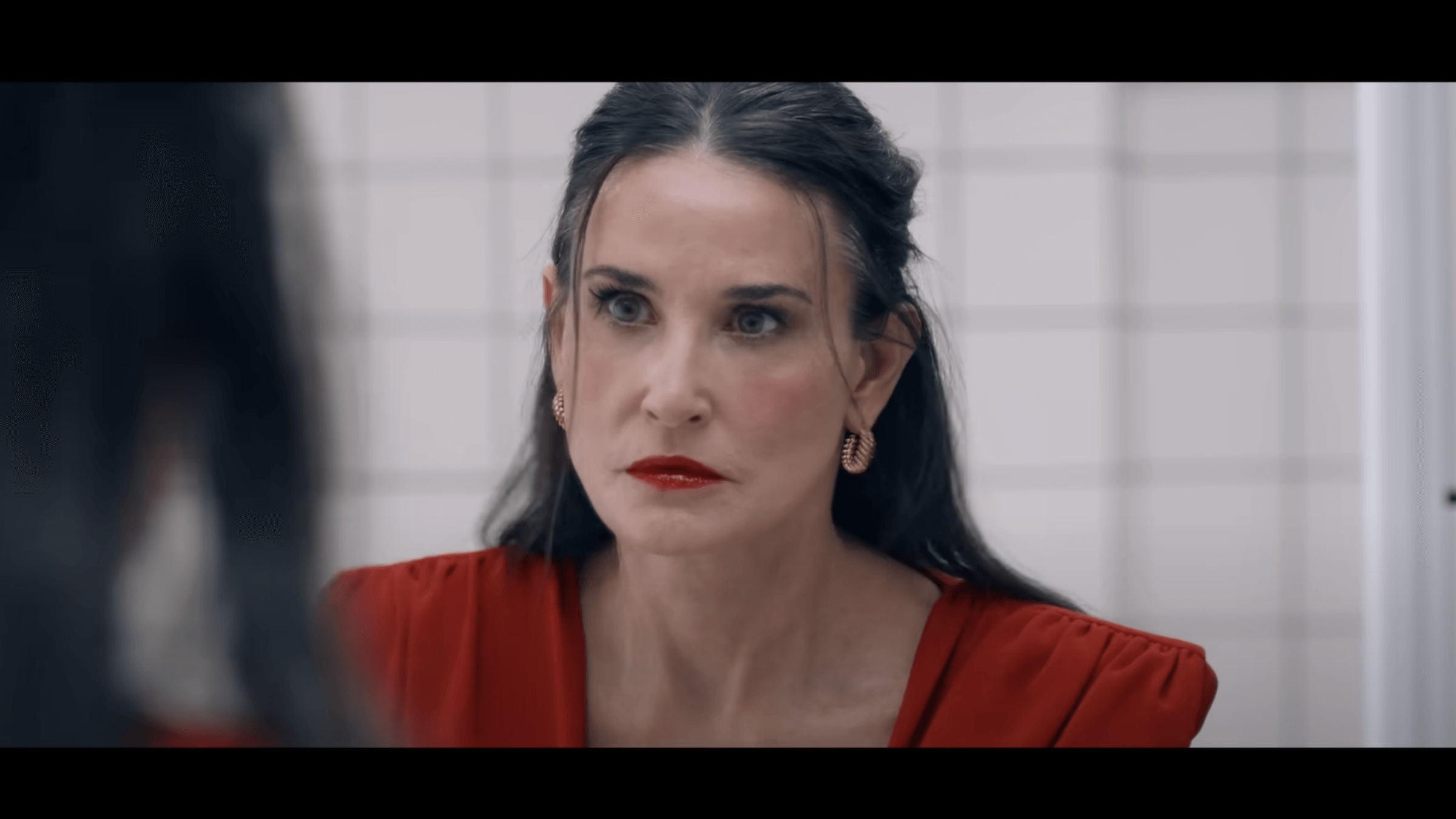What would Judaism have to say about ‘The Substance?’
3 rabbis weigh in on aging, beauty and body horror

Actress Demi Moore stares at her reflection in the mirror in a YouTube screenshot from the trailer for The Substance Courtesy of MUBI/YouTube
An aging TV star takes an injection called The Substance to allow her to experience life as her younger self for seven days at a time. When the Hollywood star starts abusing the drug to maximize the time she spends in her younger body, the experiment goes awry, and gruesome horror ensues.
The Substance, written and directed by Coralie Fargeat, is scary because it reflects something true. The film critiques the way the entertainment industry idolizes youth, and the way society treats a person’s naturally aging body as something to be ashamed, or even afraid of.
But what would Jewish tradition and wisdom say about taking The Substance if it were real? After all, in the age of botox, plastic surgery, and artificial intelligence, we aren’t so far off from this dystopia ourselves.
I asked three North American rabbis of different denominations — Reform, Conservative and Orthodox — that very question. I set out on a journey to determine once and for all, would the Substance be kosher?
“A variety of creations”
“Growing older is part of the truth of our lives,” said Rabbi Laura Geller, a retired Reform rabbi in Beverly Hills and co-author of the book, Getting Good at Getting Older.
Geller described how the protagonist’s situation in The Substance was not unique. Even our Biblical forefathers wrestled with anxieties about their changing appearances.
The Babylonian Talmud relates how an elderly Abraham wakes up one day with gray hair. “He said, ‘Master of the universe, if You have given me white hair as a mark of old age, [I do not find it attractive].’ ‘On the contrary,’ God replied, ‘the hoary head is a crown of glory.’”
“That’s funny, right?” said Geller, who had gray hair herself. “In fact, you look at me and you see white hair and you see wrinkles.” She smiled. “You should honor me when I walk into a room.”
Geller conceded that Jewish texts indeed recognized the value of physical beauty. There is even a blessing people say when they see an extraordinarily beautiful person or natural object for the first time.
However, there is also a prayer when one sees someone with an abnormal appearance, which thanks God for creating a “variety of creations.” Geller saw this blessing as proof that Halakha recognizes the value of all body types, including older people.
“We should be grateful that we live in a world where there are people who look different,” Geller said. “I don’t believe Jewish values would support taking The Substance.”
“The life journey we wear”
Conservative Rabbi Dr. Rachael Turkienicz argued that Biblical texts not only associate age with increased wisdom, but there is even evidence that the Torah depicts older women as more physically attractive.
“Sarah, our matriarch, is twice taken into harems by foreign leaders,” Turkienicz said, referring to Sarah’s abductions in the Book of Genesis. “They’re all struck by her beauty,” she said.
If a careful Torah reader does the math, the first time Sarah is abducted she is in her late 60s, and the second time she is 90 years old. “As she gets older, she gets more desirable,” Turkienicz said.
As a rabbi of an egalitarian synagogue in Toronto, Turkieniciz says the Torah is actually more progressive than modern society when it comes to women and aging. In the Torah, men like King David are attracted to older women because of their acquired wisdom.
“It’s about the idea of being attracted to the life journey,” Turkieniciz said, “And the life journey we wear on our bodies.”
“A fountain of aging”
Rabbi Boruch Leff, an Orthodox rabbi who divides his time between Israel and the U.S., said that rather than a “fountain of youth” story, the Talmud includes a “fountain of aging” story.
“Rabbi Elazar Ben Azarya was asked to be the Head of the Sanhedrin even at the young age of 18, but he was concerned that he would not be respected because he was so young,” Leff explained over email. “That night, Hashem made a miracle for him and his hair turned white! He was very happy with this and accepted the position.”
Whereas modern society diminishes the value of an older person’s appearance, “respecting elders is one of the Mitzvot,” Leff said. An older body would be associated with wisdom and respect.
But when it comes to the real life versions of the Substance — plastic surgery, botox, anti-aging cream—Leff said Halakha is murkier.
“The Talmud tells us in many places that we are supposed to care for our looks and be physically appealing,” Leff told me. At the same time, “Hashem does not want us to become too obsessed with our physical appearance, as this takes away from our true goals which should be spiritual.”
“Like most things in life, the right balance is vital,” Leff said.
A message from our CEO & publisher Rachel Fishman Feddersen
I hope you appreciated this article. Before you go, I’d like to ask you to please support the Forward’s award-winning, nonprofit journalism during this critical time.
We’ve set a goal to raise $260,000 by December 31. That’s an ambitious goal, but one that will give us the resources we need to invest in the high quality news, opinion, analysis and cultural coverage that isn’t available anywhere else.
If you feel inspired to make an impact, now is the time to give something back. Join us as a member at your most generous level.
— Rachel Fishman Feddersen, Publisher and CEO